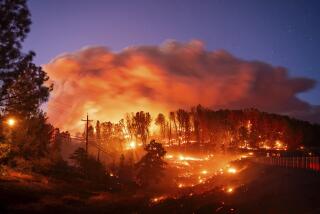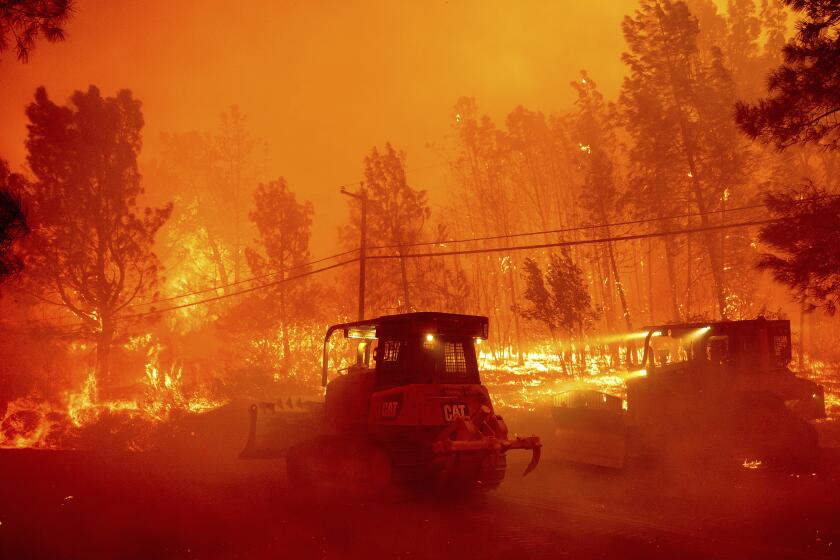Chinese teens sample American summer camp
For Tan Sheng and a group of Chinese teens, all it took was a raucous game of dodge ball at a San Bernardino YMCA to leave them dripping with sweat and falling for America — or at least for American-style summer camp.
“This was pure fun. I have never played like this before,” said Tan, 14, a student from Beijing. “In China our parents want us to study all the time.”
Schoolmate Kang Lai agreed.
“Even when we play basketball we have to use our brains. Here you just throw the ball and don’t have to think,” the 14-year-old said. “I like the American way.”
Tan and Kang are among about 50,000 Chinese youngsters this year who will jet across the Pacific for a taste of American summer camp. The majority will pass through Southern California, where local hosting agencies — especially in the San Gabriel Valley — cater to China’s rising middle class.
The two-week programs, which have grown increasingly specialized, are designed to give Chinese youngsters a competitive leg up back home.
“Summer camp abroad is very fashionable in China now,” said David Lin, president of the Arcadia-based Chinese Cultural Assn., a group that has hosted summer campers for six years. “China is developing fast. As competition intensifies, no parent wants their child to be left behind. To rise above the rest, they believe, children must be familiar with the outside world and speak a foreign language. So a trip to the world’s most powerful country is a very attractive option.”
As Chinese consumers have become more sophisticated, their expectations of summer camp have grown more demanding, he said.
In the beginning, Chinese parents did not know much about America and left all the planning up to Lin.
“It used to be simple,” he said. “We’d organize some classes where they can study English, find out about American holidays, learn something about the 50 states and maybe interact a little with American kids and go to Disneyland.”
Today, however, parents demand more targeted programming, he said. Camps now specialize in such subjects as the American judicial system, journalism, performing in music festivals or getting into American colleges.
The camps have left a deep impression on many Chinese youths.
Hu Qiyuan, a tall 14-year-old girl with short hair and glasses, was in a group of students who traveled from Beijing to visit Ivy League schools on the East Coast.
“American universities are too beautiful; some buildings are like royal palaces,” she said. “I saw students reading books on the grass in the summer after school is out. You rarely see that in China.”
Schoolmate Zhang Ying was similarly impressed by her camp experience.
“We visited the NBC studios in L.A. It was so cool to see how everything works,” said Zhang, a 14-year-old with long hair and braces. “I have never been to a Chinese TV station. I don’t know if we are allowed to visit there.”
At roughly $5,000 per student, American summer camp isn’t affordable for the average Chinese family. Most of the students who attend are enrolled in elite high schools in the Chinese capital, and their parents have made it a priority to invest in their future.
High-spending parents often have high expectations for summer programs, however, and local organizers must carefully consider just how much “fun” students should have at camp. In the United States, most people think of summer as a break from school; but in China, the hot season is more a continuation of school and learning.
“The parents make sure we fit some classroom time into the program because in China these kids would be spending their summers in tutoring classes that are not so different from regular school,” said Joyce Zhao, chief executive of the American Chinese Academy, a Monterey Park-based after-school program that began hosting Chinese summer campers this year.
At the Highland YMCA in San Bernardino, the visiting students had a chance to chat with their American counterparts about these differences.
“I really envy these kids. They have so much time to play,” said Yuan Mengyao, 13, after talking to some Highland YMCA day campers who said their days were filled with games, crafts, swimming and all kinds of sports. “Some people say it’s a waste of time. I think you can learn a lot by playing together and building friendships.”
chingching.ni@latimes.com
More to Read
Sign up for Essential California
The most important California stories and recommendations in your inbox every morning.
You may occasionally receive promotional content from the Los Angeles Times.






